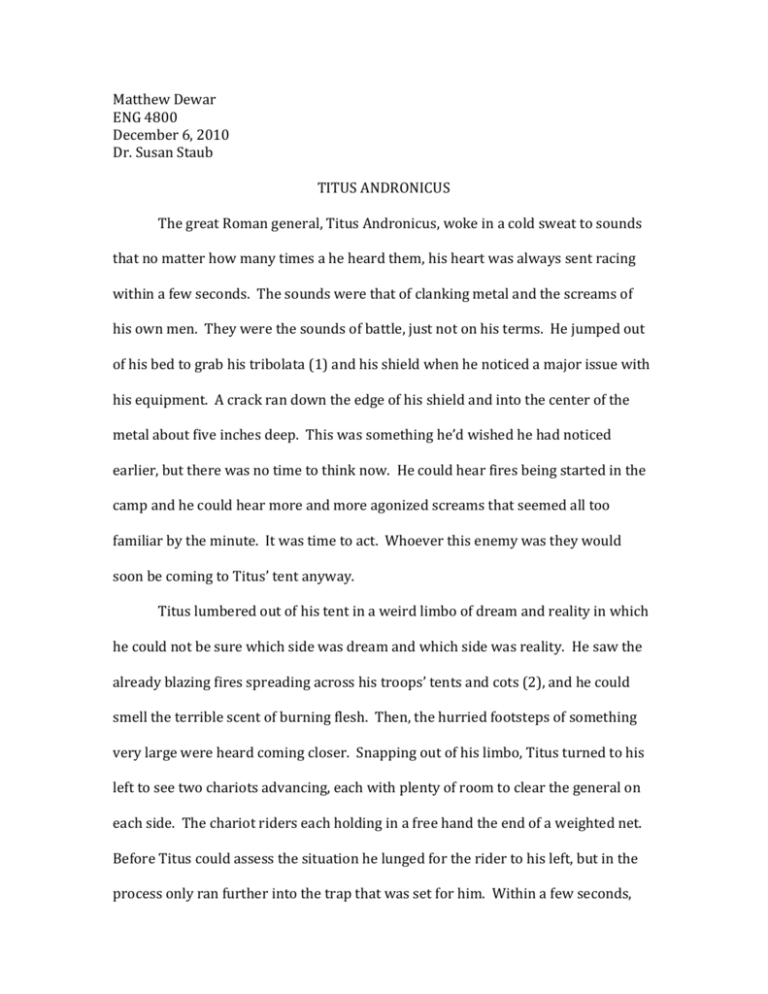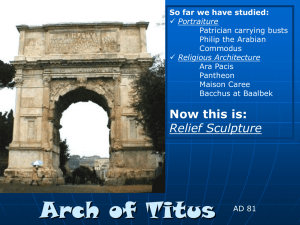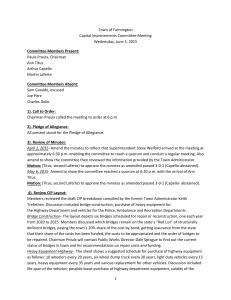Titus Andronicus and PTSD
advertisement

Matthew Dewar ENG 4800 December 6, 2010 Dr. Susan Staub TITUS ANDRONICUS The great Roman general, Titus Andronicus, woke in a cold sweat to sounds that no matter how many times a he heard them, his heart was always sent racing within a few seconds. The sounds were that of clanking metal and the screams of his own men. They were the sounds of battle, just not on his terms. He jumped out of his bed to grab his tribolata (1) and his shield when he noticed a major issue with his equipment. A crack ran down the edge of his shield and into the center of the metal about five inches deep. This was something he’d wished he had noticed earlier, but there was no time to think now. He could hear fires being started in the camp and he could hear more and more agonized screams that seemed all too familiar by the minute. It was time to act. Whoever this enemy was they would soon be coming to Titus’ tent anyway. Titus lumbered out of his tent in a weird limbo of dream and reality in which he could not be sure which side was dream and which side was reality. He saw the already blazing fires spreading across his troops’ tents and cots (2), and he could smell the terrible scent of burning flesh. Then, the hurried footsteps of something very large were heard coming closer. Snapping out of his limbo, Titus turned to his left to see two chariots advancing, each with plenty of room to clear the general on each side. The chariot riders each holding in a free hand the end of a weighted net. Before Titus could assess the situation he lunged for the rider to his left, but in the process only ran further into the trap that was set for him. Within a few seconds, Titus was trapped and helpless without a spear and holding only his broken shield to lend him strength. Unfortunately for a Roman soldier, his shield is often an exact measure of his manhood (3), and the break in its once well-polished surface was only a bitter enforcement of Titus’ current defeat. All that the great general desired at the moment was to see the face of his attacker instead of the shroud in night ambushes and raids. His newfound anger was soon removed though with the addition of a blunt force to the back of his head, followed by a quick fall to the ground, and a deep, dark sleep. He awoke to the feeling of asphyxiation and the sensation that he was underwater. As quickly as he was awoken, he was pulled by the collar of his shirt back into the dry air of the night. “So we have finally caught up to you Titus,” said a cold voice emerging from the shadows. It was still dark out. Titus assumed it was probably two or three in the morning by the looks of the sky and the cold chill hanging in the air. More importantly though, he was finally face to face with his attacker. It was the pale, familiar face of one of his more recent enemies. He had seen this face earlier that very day on the plains of the Danube (4) in a battle in which both sides extracted many casualties and Titus and his men were forced to flee with their lives. His current troop of a couple hundred men held no chance against the Gothic battalion of two thousand currently held by Hermanric (5), their Gothic King, the enemy of Rome. The Goth-King’s pale complexion shone with an eerie treacherous hue (6) in the half-moonlight. He had the pale complexion known of a Goth that Romans distrusted almost as much as their darker skinned Barbarian enemies (7). Titus had thought their escape into the dunes of the Danube with such a small company of men had been sure-fire and that they would get back to Rome just in time to assemble reinforcements. This was clearly not the case now. ‘Oh, if only we had moved farther, my men might have escaped!’ thought Titus to himself as he lamented his poor decision and the safety of his troops. Two of his sons were with him! What would become their fate? Titus could only pray to Clementia (8) that Mercutius and Gaius had made it out of the camp just in time. “Well Titus, you thought you would be able to murder hundreds of my men and get away without me capturing you? Without me exacting vengeance upon you for your sins again me and my sons!? What a foolish excuse for a soldier and general you are.” Said Hermanic with a slight hiss to his voice that rendered his appearance seem even more unnatural. “I hope I do not need to remind you that four of my sons have now fallen to your sword. If you had forgotten though, I’ve arranged quite a funeral for your two sons, and yes, I do know that your sons are here. Mercutius and Gaius, was it?” Hermanric whistled to his side and two soldiers of the Gothic army proceeded, carrying with them the battered remains of a once perfect Roman soldier. Titus took one glance at the abused young man and almost gave way to tears. The bruised and beaten soldier was once his own son, Mercutius. The shipwrecked body of Mercutius was barely holding on to life at this point. “I see that you recognize your son. The slave of Rome, Mercutius. He has a very important task to play tonight in his father’s downfall. Say your goodbyes Titus, this will be the last waking moment your son has.” Hermanric gave the order, all the while never taking his eyes off of Titus’ pain-stricken face. Titus witnessed his own defeated son’s demise as one of the Goth soldiers pulled out a knife and cut Mercutius’ throat. Titus raged and screamed as he watched the red life slip out of his son’s body, but all his strength and parental distress was no match for the ties that bound his hands and feet together. He was as helpless as a wounded calf after the hunt. He had been beaten in war and then hunted down like an animal, and now Titus had to see the maddening death of one of his children. Tears streamed down his face as his son went limp and left this mortal world. “Take him to the rest of the bodies,” Hermanric told his men with a cold resolve only found in the act of revenge. “Now bring out his other son, the smaller one. Watch very carefully Titus.” Soon after Mercutius was dragged off the Goths carried out a new beaten and bruised soldier. This was Titus’ other son, Gaius. Gaius was barely nineteen years old. He had accompanied Titus on this trek because it had simply been that of a recon mission on the current Goth advancement. Gaius was still a boy in Titus’ eyes but he held a fire in his soul that unnerved the greatest of warriors on the field of battle and his technique had been fearless. This was not how Titus imagined his son’s destiny unfolding. He had imagined Gaius as one of his only sons worthy enough to become the General of Rome. Here is where the destiny of Gaius was to unfold; in the bloodstained fields of a Roman camp on the frontier, not by the hands of battle but by the punishment of capture by Goths. “Truly a shame that this one of yours has to fall so soon Titus. He put up quite a fight killing about ten of my men just so we could capture him. Still, that only makes our next move all the more enjoyable. You see Titus, we decided that we can’t simply stab such a great warrior and be done with it. In my great judgment I have decided to bury him, alive.” Spoke the Goth-King more so to Gaius than to his father. Gaius responded without the terror that Hermanric expected though. Instead, Gaius immediately spit in the king’s face. This last act of defiance took all the calculated joy out of the event for Hermanic. “You think that’s funny you little whelp? Now it’s my turn to show you how I feel. Throw him in!” In Titus’ panic he had failed to notice the freshly dug and empty grave about twenty paces in front of him. Hermanric’s men dragged the fiery Gaius to the grave and dropped him in with bound hands and feet. The two soldiers then picked up their shovels and began piling raw earth on top of Gaius. All the while Titus could hear Gaius’ screams of anger, rage, and panic swelling and then quieting under the pounds of dirt now piling on top of him. The quieted screams of the once ferocious warrior were more than Titus’ sanity could take. Once the screaming could no longer be heard, Titus faced the Goth-King. The passion behind his eyes was one that the calm general rarely submitted to, but this was a special case. “Hermanric, I know why you have committed these great atrocities. I know now the pain of losing a son. But, don’t you think for one damn minute that I’m going to let this happen while I sit idly by.” Titus then took this moment of distraction based on the anticipation of his words to fly all of his weight backwards into the skull of his nearby captor. As the back of Titus’ head made contact with the skull of the Goth soldier directly behind him, the soldier’s knees went limp and he fell to the ground in a heap. Titus sprang to his feet in an instant and was heading to duck behind some flaming tents when he felt a familiar call to sleep on the back of his cranium. The club met with Titus’ head and he crumpled to the ground and passed out. Titus woke in a dimly lit tent with little clue as to what had happened in the last twenty-four hours. He sat up with his hands still bound and, as he attempted to pull apart the ropes, he remembered everything. He recalled the night raid, the capture of himself and his sons, and the final thievery of life from his own children. Anger such as Titus had not experienced since his youth fueled his veins and heated his resolve. He began to look around the unfamiliar terrain of the tent for some idea of what to do and how to get out of his current predicament. As he looked around he noticed the half-torn Roman flag near the opening of the tent and realized he was in one of his own soldier’s tents. He then noticed a convenient strip of sharpened metal lying near the opening of the tent. It looked to be part of plumbata (9). At the very least it could help him cut his bindings. Titus scrambled once again to his feet and hopped over to the spot with his bound feet and hands and situated himself on the ground in front of the shard. With his hands behind him he picked up the metal and began sawing at the rope when he heard the sound of footsteps outside of his tent. At that moment, the last thing Titus was thinking was that those footsteps were friendly. He stuffed the shard up his sleep and hoped for the best. “What are you doing in here swine? I can hear you hopping inside this tent like a lame Moor“(10). The guard entered the tent to find the Roman lying on the floor in apparent disarray. “Sir, if I could just have some water. That is all I ask of you.” Said Titus with the most pathetic tone of voice he could muster. “Well, I suppose a little water wouldn’t hurt anything. After all, we don’t want you dying of dehydration before the King gets around to you. Don’t move.” The guard was gone without any idea as to the mistake that he was making. In the meantime, Titus took the blade back out of his sleeve and began sawing away at his bonds. In no time he had freed himself from the blistering and cheap Gothic rope that forced him to be helpless for too long already. It seemed as though his anger was becoming even greater now that he could once again taste his freedom. First though, there was the guard with water to deal with. Titus hid in a fold near the opening of the tent and simply waited for the Goth to return. As the soldier wandered back into the tent he dropped the gourd of water at the realization that the captured general was gone. He was about to begin searching around the room when a hand cupped his mouth from behind and a sharp pain entered into his heart. Titus quickly dropped the body on the ground and then took the soldier’s armor for his own. If Titus was to get out he would have to blend in, but first, he wanted to visit Hermanric one last time (11). ‘No! I must save Rome first!’ thought Titus. The poor beaten general then began to lose his resolve battling with his duty to Rome and his urge for vengeance. For the first time he began to give real thought to the loss of his sons. He saw their dying faces and he heard their guttural sounds of death as they each heaved their last breaths. Soon the anger became unbearable within his confused soul. Before he realized what he was doing, Titus was sitting on the floor crying like a babe in the middle of the tent. His very mind seemed to become unhinged within an instant and Titus became completely unaware as to where he was or what he was even doing for that matter (12). The gods had other plans for Titus on that day though. Just as Hermanric was planning to make a visit with Titus for what he thought would be the last time he notice a Roman flag come flying over the dune in front of him. This one flag soon became a few flags, and then a handful of flags, and at last an army of men were riding over the hill towards the camp. Hermanric ordered his men to retreat immediately due to the horde of Roman soldiers coming over the hill. The Goth-King had little reason to stay here anyway. He had already completed what he wanted to here. Still, it would have been nice to finally do away with Titus. At least he had dealt Titus the blow he had been wishing for. The blow that would exact his revenge for every one of his lost sons and the blow that would bring Titus to his knees. That day the soldier’s found their defeated General crying in the middle of an abandoned tent. Besides finding Titus, there were very few survivors, and when the Romans discovered what had happened to Titus’ sons, they began to understand just what had happened to their fearless leader. They saw what had caused the idol of their army to break and succumb to emotion just like any other man. It took Titus a few weeks to come back from his dream world of pain and when he did, he was nothing like the fearless and caring general that they had known before. He was now no more than a paranoid (13) and angry man that wanted only his enemy’s demise. Once Titus was fully aware he took his men back to the Danube and conquered his Goth enemies. He followed their king all the way back to the Goth homelands and promptly had him executed with a vengeance that frightened many of Titus’ own troops; the kind of anger that could only be exhibited by a madman. 1. The main weapon of the Roman army during the Gothic War was that of the Tribolata (see Bishop et. al, 2006. p. 201). This was similar to a spear in its creation with a head of about 222mm and a shaft of about 1.03 m. The spear featured a barbed head for the tearing of clothing and causing heavy and irreversible damage to flesh. 2. Much like modern militaries, Romans used tents and cots to house themselves and their equipment at night during travels (see Bishop et. al, 2006, p.262). These tents were often made of animal hides. 3. The common belief among Roman soldiers was that if one’s spear or shield broke, it was a sign of “lost manhood.” The Roman military strategies depended upon each soldier having a fully operational shield and spear (see Hanson, 2010. p. 227-228). 4. The majority of the battles during the end of the Roman Gothic War were fought on the banks of the Danube River in Germany. This was due to the fact that the river was the largest in Europe at the time and was seen as a strategic location (see Gibbons, 1955. p. 129). 5. In a period of about 40 years the Goths advanced upon Roman territory from the Danube to the Atlantic. Much of the fighting during those 40 years was at the Danube River under the Gothic rule of the king Hermanric (or Ermanric)(see Gibbons, 1955. p. 157) 6. Moors and Romans alike held the ideal that the pale complexion of the Goths was treacherous and deceiving (see Royster, 2000. p. 435) 7. Romans found any hue that was lighter or darker than the Roman complexion to be untrustworthy and to mark something less than Roman, such as Barbarian (see Royster, 2000. p. 440) 8. Many Roman soldiers during the nearing end of the empire prayed to Clementia, the Roman Goddess of Mercy. (see Gibbons, 1955. p. 224). 9. Roman soldiers carried five smaller spears about the length of a man’s forearm behind their shields called plumbata. These smaller weapons were designed for close-range combat, explaining why it would have been found inside a Roman tent after siege (see Bishop, 2006. p. 202). 10. Many Goths despised the Moors just as they despised the Romans. Moors were seen as a darker evil to the pale complexions of the Goths (see Royster, 2000. p. 448). 11. Many soldiers will become completely indecisive during the immediate effects of PTSD, which is caused by extremely traumatic experiences. Simple instincts such as “fight or flight” will become looped within the brain.(see Tanielian, 2008. p. 117). 12. Many times one of the immediate symptoms of PTSD is the loss of awareness. Many soldiers will completely forget where they are or what they should be doing during or after the traumatic moment. (see Tanielian, 2008. p. 36). 13. Soldiers suffering from PTSD often suffer dramatic personality changes relating to paranoia and uncontrollable emotions. (see Jones et. Al, 2005. p. 212).









